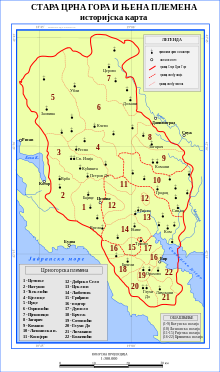Ozrinići (tribe)
Ozrinići (Serbian Cyrillic: Озринићи) is a tribe in the of the Montenegro Vilayet and Principality of Montenegro.[1]
History[]
Jovan Cvijić listed 21 tribes in the territory of Old Montenegro, 7 in Brda (Highlands), 16 in Old Herzegovina and 2 in Primorje (Montenegrin littoral). They were divided into two distinct groups; Old Montenegrin, and the tribes in the Highlands. The latter were concentrated in the northeast of Zeta river, and predominantly consisted of tribes who fled Ottoman occupation, and got incorporated into Montenegro following the battles at Martinići and Kruši. Ozrinici tribe are mentioned as part of an old Montenegrin tribes (1796).[2]
Ozrinići was first mentioned in the 1489 charter of Ivan Crnojević, then in the 1570–71 defter (tax register) of Dukagjin. Five families of the Ozrinići founded the settlement of Ozrinići in the Nikšić area in 1597.[1] Ozrinići was the largest tribe in Katunska nahija, one of the four provinces of Old Montenegro.[when?]

In 1829, the Ozrinići and Cuce had an armed conflict against neighboring Bjelice, and Petar I Petrović-Njegoš sent Sima Milutinović Sarajlija and Mojsije to negotiate peace among them.[3]
Anthropology[]
Ozrinići included the villages of Barjamovica, Velestovo, Markovina, Maklen, Kčevo, Ploča, Lastva, Ožegovići.[4] All Ozrinići have the slava (feast) of Aranđelovdan (Michael).[5]
Notable people[]
This section does not cite any sources. (June 2015) |
- Milena Vukotić
- Janko Vukotić
- Dušan Vukotić
- Momčilo Vukotić
- Vito Nikolić
- Živko Nikolić
- Milo Đukanović
- Aco Đukanović
- Željko Šturanović
- Žarko Varajić
- Vojo Gardašević
- Blažo Perutović
- Dragoljub Mićunović
- Dušan Spasojević
- Saša Radulović
References[]
- ^ Jump up to: a b Петар Влаховић. Гласник Етнографског музеја у Београду, књ. 64. Etnografski muzej u Beogradu. pp. 231–. GGKEY:7LRL4EYK77W.
- ^ Morrison 2008, p. 19.
- ^ Miloš Oben; Michel Aubin (1989). Njegoš i istorija u pesnikovom delu. Književne novine. p. 63. Retrieved 7 May 2013.
Бјелице су племе у Катунској нахији. Водили су 1829. оружану бор- бу са два суседна племена, Озринићима и Цуцама. Да би успоставио мир, Петар I је решио да им пошаље Симу Милутиновића и Мојсија
- ^ Kaiserl. Akademie der Wissenschaften in Wien; Österreichische Akademie der Wissenschaften. Philosophisch-Historische Klasse (1987). Schriften der Balkankommission, Linguistische Abteilung. Alfred Hölder.
- ^ Vidak Vujačić (1980). Etos Crnogorke: tradicionalni oblici i sadržaji u životu Crnogorke. NIO "Pobjeda," OOUR Izvadačko-publicistička djelatnost.
Na primjer, svi Ozrinići slave Aranđelovdan. Neorganizovanija plemena, pak, nijesu imala zajedničku slavu, kao na primjer: Crmničani, Njeguši, Cuce, Bjelice, Ceklići, Grahovljani, Kuči, Rudinjani i drugi. Naravno, svako posebno bratstvo u ...
Sources[]
- Nebojša B. Drašković (1999). Čevsko Zaljuće i Donji Kraj sela u plemenu Ozrinići. Odbor za proučavanje sela SANU, kulturno-prosvetna zajednica Republike Srbije.
- Petar Pejović; Mihailo Burić; Novak Ražnatović; Drago Ćupić (2004). Ozrinići: pleme stare Crne Gore. P. Pejović. ISBN 978-86-905597-0-1.
- Ottoman period in the history of Montenegro
- Principality of Montenegro
- Cetinje Municipality
- Tribes of Montenegro